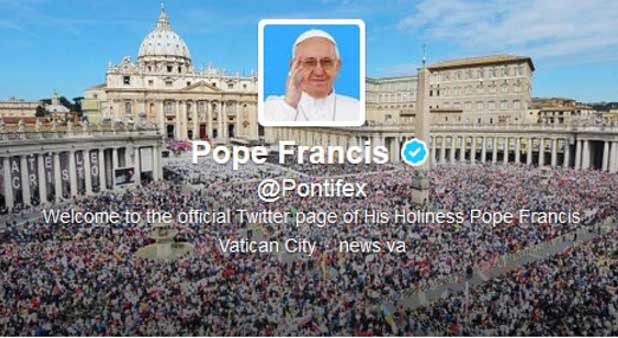How to Tweet Your Way Out of Purgatory, But With a Little Work
Following Pope Francis’ Twitter feed may be good for your soul—both in this life and the next.
The spiritual leader of the Roman Catholic Church plans to grant plenary indulgences by Twitter during the World Youth Day, which will be held July 23-28 in Brazil.
The indulgences, which Catholics believe can reduce the time a soul spends in purgatory, will be available to Francis’ nearly 7.5 million Twitter followers in all languages—if they tune in to World Youth Day broadcasts or take other spiritual actions. To get an indulgence, Catholics must have already had their sins absolved by a priest.
Pope Francis issued a decree about indulgences and social media on July 9, according to the Rome-based Zenit news organization, which covers the Vatican.
“The faithful who on account of a legitimate impediment cannot attend the aforementioned celebrations may obtain Plenary Indulgence under the usual spiritual, sacramental and prayer conditions, in a spirit of filial submission to the Roman Pontiff, by participation in the sacred functions on the days indicated, following the same rites and spiritual exercises as they occur via television or radio or, with due devotion, via the new means of social communication,” the decree states.
Giving indulgences by social media means the faithful get the spiritual benefits of World Youth Day even if they can’t be there, says Bob O’Gorman, a retired religion professor and author of The Complete Idiot’s Guide to Understanding Catholicism.
O’Gorman says that major Catholic events such as World Youth Day have been seen in the past as opportunities for forgiveness and renewal.
Even people who can’t travel to a major church event or pilgrimage can still experience that forgiveness, O’Gorman says, if they take some kind of spiritual action.
The idea comes from the Bible, O’Gorman says.
Jesus told His disciples in the Gospel of Matthew that where two or more of them are gathered in His name, He would be present in their midst. Being in Jesus’ presence is a way to be forgiven, O’Gorman says.
“This is a way to reconnect with God,” he says. “A lot of this is about the sense of separation we feel from God.”
In medieval times, that spiritual action often involved making a donation, which led to corruption, he says.
Today, that can mean tuning in to broadcasts from World Youth Day or following it on Twitter.
“I think it’s a great idea,” says Eileen Daily, assistant professor of pastoral studies at Loyola University Chicago. Daily, who has studied how Catholics use social media, says Twitter can help Catholics make faith part of their everyday life.
It’s a bit like keeping count of the time spent on a treadmill or other exercise equipment as part of maintaining physical health.
Instead of just sitting and passively watching the telecasts from World Youth Day, Catholics will actually be taking part.
“It gives people a chance to apply it to their lives,” she says.
Daily says that as a Jesuit, Pope Francis is used to seeing God in every part of life. So combining Twitter with the ancient practice of indulgences makes sense.
But the pope’s new decree doesn’t make it easy to get an indulgence, says Scot Landry, cabinet secretary for Catholic Media in the Archdiocese of Boston. He worries that some people may misunderstand how the church views indulgences.
“Receiving an indulgence by the church is a high bar,” he says. “What you need to be able to do is to go to confession, receive Communion. .… A lot of the headlines are making it seem like this is an easy step.”
Grant Gallicho, associate editor of Commonweal magazine and a prolific blogger @gallicho, also believes the pope’s Twitter indulgences are a good idea.
“In 2001, Pope John Paul II granted indulgences to Catholics who walked through the bronze door of St. Peter’s Basilica,” he says. “A door is just another kind of technology. For most young people today, their doorway to the marketplace of ideas is social media. Why shouldn’t Twitter serve as a way into the Church?”
Brooke Happ, 21, a student at Illinois State University, says she will be following World Youth Day events using Facebook and other websites. She says it is important that followers understand the meaning of an indulgence.
“Just because they read something on Twitter, or just because the pope says he will offer indulgence on Twitter, it doesn’t mean that the person automatically receives indulgence,” Happ says. “There is a responsibility on the person that he has to fulfill.”




























































